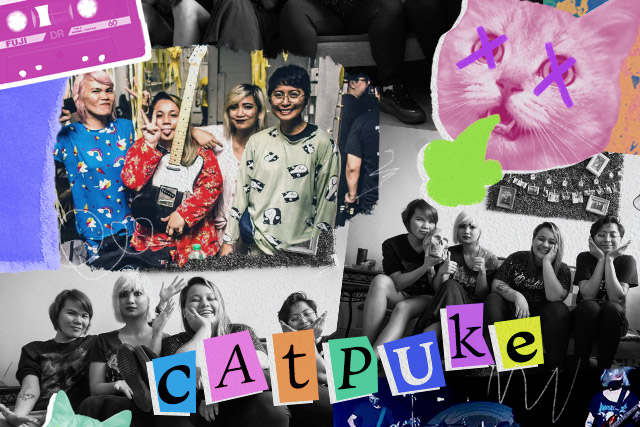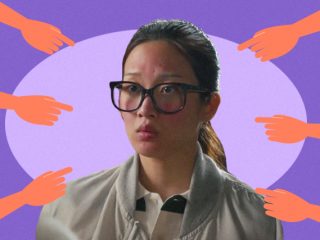It was during one of the pay-what-you-can benefit punk gigs organized by the Counterflow music community when I first watched Catpuke (pronounced as cat puke, as you can surmise from their band logo) perform in 2019. In the dimly lit and comfortably crowded floor of friendly neighborhood gig bar Mow’s, I was introduced to the band members before they came on stage for their set. Surrounded mostly by friends and fairly new as a group, the band came off as quietly cool and kind—which I sort of expected (I was in a benefit punk gig after all).
When it was the group’s turn to perform, it felt like being in the throes of war—which took me by surprise. I didn’t Google Catpuke beforehand and so it was only then when I found out that it was a progressive hardcore punk band. The four-piece group consists of vocalist and guitarist Jamie Ogalesco, guitarist Grois Enayo, bassist Papat Catriz and drummer Ten Derillo Pagalunan.
Fast forward to 2021 and the band’s music remains raw, aggressive and unrelenting. In December 2020, Catpuke launched its first E.P. “K.T.M.” and then its cassette tape version in January 2021. In between the band’s planning for the release of its next self-produced album, I managed to have a chat with the members on their process, the local DIY punk scene and their struggles as musicians.
How would you describe Catpuke in one word?
Papat Catriz: Angry, ‘cause that’s how we always describe ourselves.
Jamie Ogalesco: I’ll go with passionate. Of course, it is angry but I think it’s rooted from the fact that we’re very passionate about [our] message.
Grois Enayo: Empowering. That’s what we always try to practice and the kind of message we try to get across.
Ten Derillo Pagalunan: Ang lagi kong sinasabi ay tunog-riot [kami].
What role does each member play?
Ten: I play the drums. I’m the mother. I [provide] the motherly love in Catpuke.
Papat: I’m the bassist…and the visual. Charot! I do most of the art. I made the cover for the singles we released. I’m the social media manager and they also gave me the title, Mother Danger.
Jamie: Well, I yell. Taga-send ng memes, but Papat also does that. Taga-mix ng mga demos. I tend to start the songs and I bring them to the table. My job is also to ask where we’re going to eat.
Grois: I play the second layer of guitars.
Papat: Ikaw yung pinaka-objective sa atin. Second voice of reason [after Ten]. You also make the Excel sheets!
What’s the band’s origin story?
Jamie: Before we formally [debuted] Catpuke, the band went through a lot of changes. If I remember correctly, we had a different drummer and a different bassist. They weren’t replying in the group chat we made but [I already wrote] a song called “Pulse.” I was like, “F*ck this. We’re going to have to look for people who actually care about this sh*t.” When the four of us met, we just gravitated towards each other. We jammed once in 2017. Never met for a year. Once we [reunited] in 2019, we just [started] making music straight. It was meant to be.
Papat: It was easy because we were all already friends. I met Jamie during a recording with my old band. Jamie offered me pizza, which I do not eat.
Ten: Grois and I were in a band together called Death to Puberty. Matagal na yun. Decades na rin.
Grois: Back [when we were forming Catpuke]—I’m not saying that we didn’t really plan on making politically-heavy songs—we just really wanted to play punk music.
Let’s break down the “K.T.M.” EP. What does the title stand for and why did you choose it?
Jamie: “K.T.M.” stands for kill the man. At the time when the single was released [ahead of the EP], the Anti-Terror Law was passed. Our lawyer friends told us that the [spelled-out] title was too hot and it would bring unnecessary attention to our band. It was a compromise.
Tell us about each of the songs in the album.

Grois: Yung intro, sobrang dami niyang pinagdaanan na layers of changes. It started as a simple arrangement that sounded heavy and slow. The intention was [magkaroon] kami ng [pang-soundcheck.] To be honest, di ko pa rin naririnig yung lyrics. (Laughs) It sets the tone that [the rest of the album is made up of] really angry music. Yung track na yun yung [isa sa] may pinaka-wild na growl ni Jamie. Very gritty and foreboding.
Papat: Isa siyang deep inhale bago ka sumabog.

Jamie: “Pulse” is about the Orlando nightclub shooting. LGBTQIA+ people were shot while they were in an LGBTQIA+ space. It was written from the perspective of someone who was inside the Pulse nightclub. I read that one of the victims locked themself in the bathroom and gave a live account to their mom through text. It’s a song that asks, “Why do you have to kill me? Why do you have to hurt me? I just want to love the person that I love.” I’m queer and it’s something that’s close to my heart. As the first Catpuke song, it set the tone for our music to not be overly cynical. The lyrics say that love is stronger. It’s empowering.
Ten: Ang timely niya [rin] dito sa Pilipinas[, considering the case of] Jennifer Laude and Cavite 3. Ano yung ginawa nilang mali? Bakit nila kailangan danasin ang ganitong klaseng krimen? Yung rhythm nya ay dance-y but it’s really heavy.

Grois’ fave track
Papat: Jamie wrote “Eat The Rich” after I suggested it when I finished watching “Hannibal.” We released it as a single early in the lockdown when sobrang na-highlight yung gap between the rich, the middle-class and the poor. I feel like it’s something that is easy to understand in this political climate.
Jamie: During the writing process, I remember just being very angry. [I remember thinking,] “If you continue hoarding resources, we’re going to f*cking eat you.”

Jamie’s and Ten’s fave track
Papat: “Warsuxx” went through a lot of changes lyrics-wise. It’s about the casualties of war, any kind of war. It includes the War on Drugs, the war against the poor. The second verse is written through the perspective of someone [caught in the middle of war]. They’re looking for their parents. There will always be more losers than winners.
Grois: Special siya for me because when we were writing “Warsuxx,” it made [the members] understand better kung ano yung politics ng isa’t isa. Very important sa amin na kahit [meron kaming political] differences, Catpuke yung united front namin. Na-overcome namin yung anxiety na dinala ng differences na iyon.

Papat’s fave track
Ten: It’s pretty obvious naman na halos lahat ng nasa posisyon ay uhaw na uhaw at lasing na lasing sa kapangyarihan. Ang “K.T.M.” ay hindi lang naman [tungkol sa] isang tao, marami sila.
Jamie: It’s perfect as the closing track. We start the EP with “00:00” and the feeling [it brings] is anxiety. The song asks, “When will you wake up.” It’s so easy to fall into complacency. Then, you go to “Pulse” where the persona in the EP asks, “Why are these things happening?” “Eat The Rich” is about frustration and there’s an awareness of class struggle. “Warsuxx” is about anger and despair. Once you get to “K.T.M.,” it’s about clarity and defiance. “And if I die / May I die with hands curled into a fist.” You can listen to the EP as a story of a persona who becomes aware of how f*cked up society is and what can be done about it.
Who are your favorite musicians? Any covers that you want to do?
Grois: Locally? Ever since we watched Tiger Pussy live, naging instant favorite ko sila. [We also like] Nonentities and The Beauty Of Doubt. Ang ganda ng songwriting—very easy to connect with. Nafi-feel namin yung weight ng songs whenever we watch them perform.
Ten: Sa international, I think everyone will agree that Bikini Kill is one of our influences. Especially, [considering] their contribution sa scene.
Papat: There’s a song called “High Risk High Reward” that we were supposed to cover but we couldn’t find the lyrics. We also wanted to cover a song by Pagan. [Maybe we could do a] Carly Rae Jepsen [cover, too.]
Ten: Jamie also mentioned wanting to do a song by Gleemer.
Grois: Kapag nawala na yung anger, magshoe-shoegaze na lang kami. (Laughs)
View this post on Instagram
What is punk for you and what are some of the misconceptions about it?
Ten: [Sa banda namin ni Grois] before, Death To Puberty, [naging] malaking influence sa akin si Chuck Baclagon (who started it). [He showed me that] punk is more than just music. Hindi lang siya [for entertaining,] it has a deep message and lagi siyang may kaakibat na social issue.
Grois: One of my recent favorites is this band called War On Women. What I really admire about its singer, Shawna Potter, is that she promotes safe spaces for women, especially in the punk scene. The advocacy [has been] important for me ever since we started attending hardcore shows. Inclusive naman yung community pero may mga sitwasyon pa rin when you’d feel like you’re not being taken seriously. Meron pa ring mga individuals who make you feel unsafe.
Ten: Over the years, yung eksena kasi talaga ay male-dominated and meron din talagang gatekeepers. It’s really hard to fit in lalo na kung babae ka or part ka ng LGBTQIA+. Malaki yung [mga naging] changes from that. Yung mga communities na kinabibilangan ng Catpuke, ang Counterflow and Sleeping Boy Collective, are aware of those struggles. Napakahalaga na you express your opinion and dissent. Revolution is not a one-time event. Tiger Pussy dominating the stage at yung simula ng [pagba-banda] ng mga babae, malaki yung naging contribution nila in the long run.
Jamie: A lot of people think na punk is just an aesthetic—spikes or leather boots. I was first exposed to punk through pop-punk. I’ll just say it. Hayley Williams opened my eyes. Girls can do that?! It was mind-blowing to see a woman in such a male-dominated space be heard. Punk to me is carving out space for yourself. Punk is special because there’s this feeling of collectiveness. Tama rin si Grois na there’s doucheyness, but punk for me is the [sense of] belonging in the other. Punk music really brought me through a space that made me feel that it’s gonna be okay and [I realized that] I can also make it okay for other kids.
Papat: This is going to sound really cheesy, but I think punk is supposed to be a lifestyle. It’s also what you do outside of your band, how you carry on what you perform. I really like Catpuke’s idea of punk because we join mobilizations together, we try to contribute to our communities as much as we can. You don’t get to call for the rights of communities if you’re not immersing with them.
Jamie: When I joined Catpuke, I became more aware of how to live ethically despite being in this very unethical system. You want equality and equity for everyone. Regardless of how violent it may seem, punk’s heart is so pure.
What’s the local punk scene like?
Grois: Depende siya kung saang shows ka napunta. Yung local DIY punk scene, mas naka-align siya sa hardcore punk pero I don’t think that it’s limiting. Nandun pa rin yung inclusivity that allows you to explore the direction you want to take your music to. [Sa hardcore] pa rin naa-associate ang Catpuke pero meron pa rin kaming [ibang] gustong i-bring sa songs. May mga demos na kami for a new EP that are a little different [from those of “K.T.M.”]
Papat: Wag na tayo magpa-ikot-ikot. You go to Mow’s. That’s where we mostly play. If you join protests spearheaded by SAKA, they invite a lot of punk bands.
Ten: Yung Espasyo sa Lucena, isang beses lang kami tumugtog doon pero sobrang at-home kami.
Grois: Para sa mas malalaking shows, One Two Three Block is also a good venue. Events place siya na crossfit studio rin. Kapag may ino-organize yung Counterflow, Sleeping Boy Collective and Still Ill Records, it’s one of their go-to venues.
Jamie: On a post-pandemic weekend, just go near a bar and follow people wearing black. You’ll find a punk show. Black shirt? Tight jeans? That’s it. (Laughs) Lucena punk is more hardcore. Yun talaga yung screechy na vocals. QC hardcore is more spoken. Comparing Sandy Good [of Batangas] or Choke Cocoi [of Lucena] to Legarda, mas abrasive yung [mga bands from outside Metro Manila]. Parang Catpuke sits right in the middle.
What are your thoughts on the “female-fronted” or “all-female” labels?
Ten: Kapag ipapakilala kami, sinasabi namin na wag na kaming tawaging “all-girl” band.
Grois: Mas nauuna lagi yung pag-mention ng gender. Yun yung nagiging qualifier mo para ma-introduce ka sa scene—para mas maging interesting [ka.] Cringe yun.
Papat: It’s so annoying because people never say, “Ooh, an all-male band! Ooh, a male guitarist!” I remember there was this thread in a Facebook group where they were posting pictures of women musicians. [They weren’t performance photos] and they weren’t linking any of our songs. It’s very insulting na ma-limit ka lang [to your looks.]
Jamie: There were a lot of predators in the pop-punk scene. They would [tell girls,] “Ang cool nyo naman. You play punk music.” They’re just [doing that] to stroke your ego then try to court you. It’s very manipulative. It’s not our genitals that play the instruments. It’s not my vagina that sings into the mic. I do want to say that it’s also a nuanced thing because women’s solidarity is important. If you want to engage in the scene, it’s important to have women friends who have your back. Even if our songs are general, they still come from a place of womanhood.
View this post on Instagram
What are the struggles of women and AFAB (Assigned Female At Birth), LGBTQIA+ musicians?
Papat: Kapag babae, feeling nila magco-cover ng Paramore. Charot. Pero there’s still an expectation of what we’re supposed to sound like.
Grois: Merong mga tao na kapag meron silang extensive knowledge of music and mafi-feel mo [kapag nagtatanong sila kung kilala mo ang isang band] na may [disdain.] Hindi mo kina-cool yan.
Jamie: Thankfully, we haven’t experienced this in our scene but I’ve been to dad rock shows. Very prominent pa rin yung sexism [doon]. I hear the men say things like, “Bakla ka ba?” [Homophobic remarks] aren’t addressed enough.
Papat: There were a couple of gigs where when they announced our name, they pulled back a bit and laughed. “How do you pronounce this? Is it cat puke or cat puki? Your name means vagina vagina.” We don’t mind [however you pronounce it]. But if you laugh, you’re going to have to explain why it’s funny.
What’s your advice for punk babies who are looking to get into the scene?
Papat: You got to find the right, supportive crowd. It’s really hard to be a self-producing band. Catpuke is lucky enough to have a lot of friends who we can turn to when we need help.
Jamie: Just do it and be open to criticism. Being a self-producing artist, you have to put in the hours and you can’t rely on other people to promote your stuff. Don’t wait for validation. Don’t be disheartened.
Ten: Arouse, organize and mobilize.
Grois: If nakita mong [may lacking sa scene,] ikaw yung mag-initiate ng efforts to create a community with a shared purpose.
Follow Catpuke on Facebook, Twitter and Bandcamp for more info on “K.T.M.” physical EP and cassette tape purchases.
Writer’s note: This conversation has been edited for brevity.
Art by Jan Cardasto
Photos courtesy of Hibi Rea, SAKA and Catpuke’s Grois Enayo
Follow Preen on Facebook, Instagram, Twitter, YouTube and Viber
Related Stories:
Meet Gantala Press, the feminist indie publisher fighting state violence
This ecofeminist artist has us ogling vulvas and flora
Voices of queer music: Underrated sapphic artists you should know
Girl power or feminism? What’s the difference?


